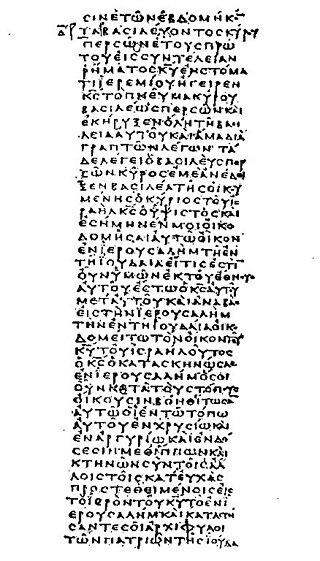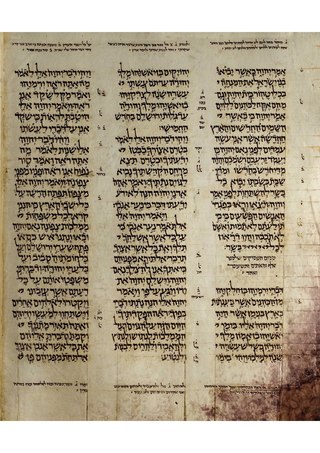
The Septuagint, sometimes referred to as the Greek Old Testament or The Translation of the Seventy, and often abbreviated as LXX, is the earliest extant Greek translation of the Hebrew Bible from the original Biblical Hebrew. The full Greek title derives from the story recorded in the Letter of Aristeas to Philocrates that "the laws of the Jews" were translated into the Greek language at the request of Ptolemy II Philadelphus by seventy-two Hebrew translators—six from each of the Twelve Tribes of Israel.

Moriah is the name given to a mountain in the Book of Genesis, where the binding of Isaac by Abraham is said to have taken place. Jews identify the region mentioned in Genesis and the specific mountain in which the near-sacrifice is said to have occurred with "Mount Moriah", mentioned in the Book of Chronicles as the place where Solomon's Temple is said to have been built, and both these locations are also identified with the current Temple Mount in Jerusalem. The Samaritan Torah, on the other hand, transliterates the place mentioned for the binding of Isaac as Moreh, a name for the region near modern-day Nablus. It is believed by the Samaritans that the near-sacrifice actually took place on Mount Gerizim, near Nablus in the West Bank.

The Bible has been translated into many languages from the biblical languages of Hebrew, Aramaic, and Greek. As of November 2024 the whole Bible has been translated into 756 languages, the New Testament has been translated into an additional 1,726 languages, and smaller portions of the Bible have been translated into 1,274 other languages according to Wycliffe Global Alliance. Thus, at least some portions of the Bible have been translated into 3,756 languages.
Old Greek is the Greek language as spoken from Late Antiquity to c. 1500. Greek spoken during this period is usually split into:
Greek Bible may refer to:

Hexapla, also called Origenis Hexaplorum, is a critical edition of the Hebrew Bible in six versions, four of them translated into Greek, preserved only in fragments. It was an immense and complex word-for-word comparison of the original Hebrew Scriptures with the Greek Septuagint translation and with other Greek translations. The term especially and generally applies to the edition of the Old Testament compiled by the theologian and scholar Origen sometime before 240.
Biblical languages are any of the languages employed in the original writings of the Bible. Some debate exists as to which language is the original language of a particular passage, and about whether a term has been properly translated from an ancient language into modern editions of the Bible. Scholars generally recognize three languages as original biblical languages: Hebrew, Aramaic, and Koine Greek.
While the Old Testament portion of the Bible was written in Hebrew and Aramaic, the New Testament was originally written in Koine Greek. The Greek language, however, has several different dialects or denominations. This required several different translations done by several different individuals and groups of people. These translations can be categorized into translations done before and after 1500 AD.
Koine Greek, also variously known as Hellenistic Greek, common Attic, the Alexandrian dialect, Biblical Greek, Septuagint Greek or New Testament Greek, was the common supra-regional form of Greek spoken and written during the Hellenistic period, the Roman Empire and the early Byzantine Empire. It evolved from the spread of Greek following the conquests of Alexander the Great in the fourth century BC, and served as the lingua franca of much of the Mediterranean region and the Middle East during the following centuries. It was based mainly on Attic and related Ionic speech forms, with various admixtures brought about through dialect levelling with other varieties.
Jewish Koine Greek, or Jewish Hellenistic Greek, is the variety of Koine Greek or "common Attic" found in numerous Alexandrian dialect texts of Hellenistic Judaism, most notably in the Septuagint translation of the Hebrew Bible and associated literature, as well as in Greek Jewish texts from the Levant. The term is largely equivalent with Greek of the Septuagint as a cultural and literary rather than a linguistic category. The minor syntax and vocabulary variations in the Koine Greek of Jewish authors are not as linguistically distinctive as the later language Yevanic, or Judeo-Greek, spoken by the Romaniote Jews in Greece.
Isaiah 17 is the seventeenth chapter of the Book of Isaiah in the Hebrew Bible or the Old Testament of the Christian Bible. This book contains the prophecies attributed to the prophet Isaiah, and is one of the Books of the Prophets. The New King James Version describes this chapter as a "proclamation against Syria and Israel".
Isaiah 19 is the nineteenth chapter of the Book of Isaiah in the Hebrew Bible or the Old Testament of the Christian Bible. This book contains the prophecies attributed to the prophet Isaiah, and is one of the Books of the Prophets. This chapter focuses on Egypt.
Isaiah 21 is the twenty-first chapter of the Book of Isaiah in the Hebrew Bible or the Old Testament of the Christian Bible. This book contains the prophecies attributed to the prophet Isaiah, and is one of the Books of the Prophets. This chapter contains prophecies against Babylon, Edom and Arabia.
Isaiah 45 is the forty-fifth chapter of the Book of Isaiah in the Hebrew Bible or the Old Testament of the Christian Bible. This book contains the prophecies attributed to the prophet Isaiah, and is one of the Books of the Prophets.
Isaiah 64 is the sixty-fourth chapter of the Book of Isaiah in the Hebrew Bible or the Old Testament of the Christian Bible. This book contains the prophecies attributed to the prophet Isaiah, and is one of the Books of the Prophets. Chapters 56-66 are often referred to as Trito-Isaiah. This chapter contains "a prayer for help" in a format which T. K. Cheyne describes as "a liturgical psalm".

Jeremiah 47 is the forty-seventh chapter of the Book of Jeremiah in the Hebrew Bible or the Old Testament of the Christian Bible. This book contains prophecies attributed to the prophet Jeremiah, and is one of the Books of the Prophets. This chapter is part of a series of "oracles against foreign nations", consisting of chapters 46 to 51. In particular, chapters 46-49 focus on Judah's neighbors. This chapter contains the poetic oracles against the Philistines.

Jeremiah 33 is the thirty-third chapter of the Book of Jeremiah in the Hebrew Bible or the Old Testament of the Christian Bible. It is numbered as Jeremiah 40 in the Septuagint. This book contains prophecies attributed to the prophet Jeremiah, and is one of the Books of the Prophets.

Jeremiah 27 is the twenty-seventh chapter of the Book of Jeremiah in the Hebrew Bible or the Old Testament of the Christian Bible. The material found in Jeremiah 27 is found in Jeremiah 34 in the Septuagint, which orders some material differently. This book contains prophecies attributed to the prophet Jeremiah, and is one of the Books of the Prophets. The New American Bible (NABRE) describes chapters 27-29 as "a special collection of Jeremiah’s prophecies dealing with false prophets", and suggests that "stylistic peculiarities evident in the Hebrew suggest that these three chapters once existed as an independent work".

Jeremiah 28 is the twenty-eighth chapter of the Book of Jeremiah in the Hebrew Bible or the Old Testament of the Christian Bible. The material found in Jeremiah 28 of the Hebrew Bible appears in Jeremiah 35 in the Septuagint. This book contains prophecies attributed to the prophet Jeremiah, and is one of the Books of the Prophets. This chapter contains a confrontation between prophets Jeremiah and Hananiah: Hananiah's false prophecy is responded by Jeremiah's answer, Jeremiah 28:1-9. Hananiah breaks Jeremiah's yoke, Jeremiah foretells an iron yoke, and Hananiah's death, Jeremiah 28:10-17.

Jeremiah 45 is the forty-fifth chapter of the Book of Jeremiah in the Hebrew Bible or the Old Testament of the Christian Bible. This book contains prophecies attributed to the prophet Jeremiah, and is one of the Books of the Prophets. This chapter closes the section comprising chapters 26–44 with the message that the prophetic word will survive through Baruch. In the New Revised Standard Version, this chapter is described as "a word of comfort to Baruch". Biblical commentator A. W. Streane calls it "a rebuke and a promise to Baruch".





